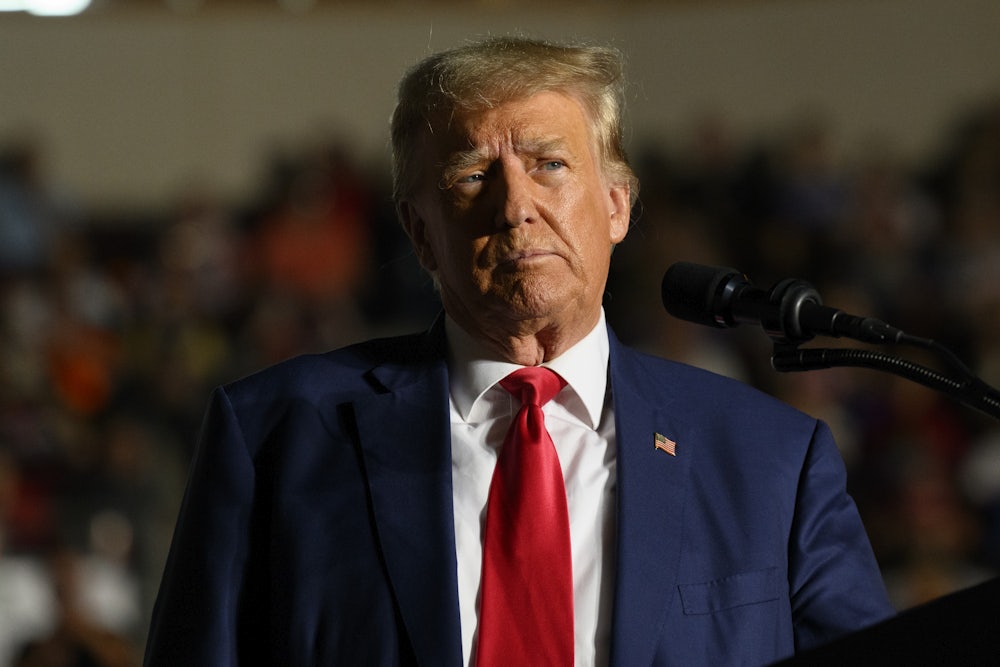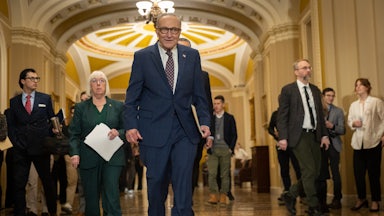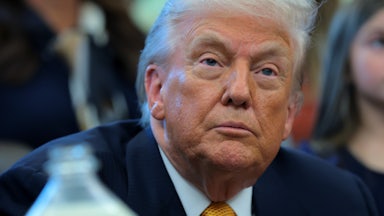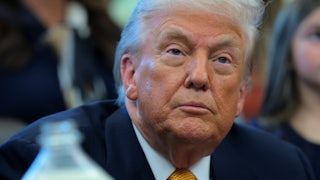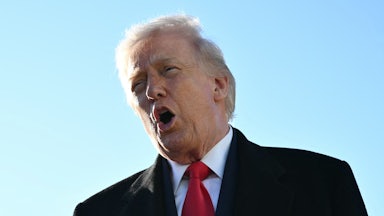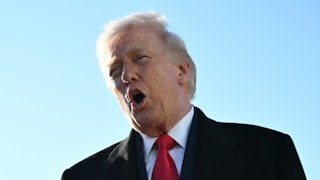Mass deportations are difficult, and the White House knows it. President Donald Trump largely failed to carry out his far-reaching immigration enforcement plans during his first term. Some of his efforts were blocked by federal courts; others were undone by practical hurdles and poor planning. Removal numbers barely rose above their Obama-era levels for most of his term.
This time around, the administration wants to be far more aggressive. The Washington Post reported earlier this month that, in internal conversations, Trump officials hope to deport at least one million people from the United States in their first year in office. This may sound feasible on paper since there are at least 1.4 million undocumented immigrants currently in the country who have received final deportation orders from immigration courts, meaning that they can be lawfully removed as soon as they are taken into custody.
But even those goals will face severe logistical challenges and may fall short. To that end, the Trump administration and its allies appear increasingly willing to use authoritarian and antidemocratic tactics against American citizens along the way—to make deportations logistically easier, to punish and criminalize political dissent and resistance, to create scapegoats for future shortcomings, or some combination thereof.
While the Trump administration is earnestly trying to remove as many immigrants from the country as it can, there is also a highly performative nature to its second-term strategy. It is not enough to cite year-to-year removal statistics from federal databases; the Trump administration wants to be seen arresting immigrants, jailing immigrants, and deporting immigrants.
To better lend his draconian policies some reality-television aesthetics, Trump officials have filmed high-profile deportations to El Salvador and promoted the videos on social media, often with dramatic movie-like scores and thriller-like editing. Their productions emphasize the humiliation and subjugation of those whom they removed from the country and the military-style nature of the operations. Trump is far from the first American president to release propaganda footage in office, but he may be the least subtle one.
Secretary of Homeland Security Kristi Noem has also gone on multiple highly publicized raids with Immigrations and Customs Enforcement agents, often in the same gear that they wear. In at least one instance, she brought along a right-wing influencer to promote them. The Wall Street Journal reported earlier this month that some ICE officials were “rankled” by her presence at a raid in New York City, one that apprehended fewer immigrants than its planners had hoped. It nonetheless served the goal of making the administration’s tactics as visible as possible.
Carrying out raids in large cities has both practical and propagandistic implications. Mass deportations are more feasible when local authorities cooperate with federal immigration officials. That cooperation has to be voluntary: Federal officials generally cannot conscript or compel state officials to help them enforce federal laws without violating a constitutional rule known as the anti-commandeering doctrine. At the same time, the federal government can welcome voluntary cooperation, as the Trump administration has done with state officials and local sheriffs in sympathetic jurisdictions like Florida.
In sanctuary cities and states, where officials have avoided helping immigration officials for public safety reasons, Trump signed an executive order on Inauguration Day that instructed the attorney general and the secretary of homeland security to “evaluate and undertake any other lawful actions, criminal or civil, that they deem warranted based on any such jurisdiction’s practices that interfere with the enforcement of federal law.” It also directed them to ensure that “so-called ‘sanctuary’ jurisdictions” do not receive federal funds “to the maximum extent possible under law.”
The “civil” aspect of Trump’s order is a familiar battleground for states and the Trump administration. During Trump’s first term, then–Attorney General Jeff Sessions tried to cut off public safety grants to sanctuary jurisdictions due to their refusal to cooperate with federal immigration enforcement. Those efforts floundered after a federal judge ruled against the Justice Department in the fall of 2017, holding that Sessions did not have the legal authority to add new conditions to the grants.
What the “criminal” aspect means could be far more sinister. Last December, a pro-Trump legal organization led by Stephen Miller, his top domestic adviser and an avowed opponent of immigration, warned more than 200 elected officials in California that they could face federal criminal charges for their sanctuary policies. In a letter to San Diego County officials, for example, the group claimed that officials could face charges ranging from obstruction and conspiracy to illegally harboring aliens.
Trump officials have also suggested that they would consider criminal charges if they face resistance from local officials. Tom Homan, the Trump administration’s “border czar,” claimed on Fox News last December that there are “laws on the books that we will prosecute” against mayors who refuse to help federal immigration officials. New York City Mayor Eric Adams became a close ally of Homan after the Trump administration dropped pending criminal charges against Adams earlier this year, in tacit exchange for his cooperation on immigration.
Sebastian Gorka, the White House senior director for counterterrorism, also recently suggested that the administration might bring criminal charges against Democrats who pushed for El Salvador to release and return Kilmar Abrego Garcia, a Maryland man deported in error by the Trump administration last month. “You have to ask yourself, are they technically aiding and abetting them, because aiding and abetting criminals and terrorists is a crime,” he claimed in a Newsmax interview last week.
This would go far beyond what past administrations have done to enforce federal law. There is no precedent for federal prosecutors to target elected state and local officials with criminal charges merely for refusing to cooperate with a president’s policy goals. Even during the desegregation battles in the 1950s and 1960s, which represented the sharpest clash between state and federal officials since the Civil War, the Eisenhower and Kennedy administrations did not prosecute or arrest segregationist governors, mayors, and sheriffs for defying court orders.
Trump and his allies often insist they have a democratic mandate to carry out their agenda. So do state, local, and federal elected officials who resist them. Prosecuting the people’s representatives for policy disputes would be a severe blow to American democracy. If nothing else, the Trump administration’s goal is apparently to induce a chilling effect on state and local leaders who might resist its sweeping immigration priorities.
One of the most disturbing cases came in February after New York Representative Alexandria Ocasio-Cortez, one of Trump’s most prominent Democratic opponents, hosted a “Know Your Rights” event webinar to instruct her constituents on the powers of federal immigration agents and the legal options they have when interacting with them. That drew a furious reaction from Homan, who suggested that informing immigrants of their rights could itself be a crime.
“Is that impeding our law enforcement efforts?” he said in an interview shortly after the webinar. “And if so, what are we going to do about it? Is she crossing the line? So, I’m working with the Department of Justice and finding out. Where is that line that they cross? So maybe AOC’s gonna be in trouble now.”
That barely veiled threat prompted the lawmaker to contact the Justice Department herself to warn about his behavior. “Mr. Homan’s repeated attempts to use your agency to politically intimidate duly elected officials are a textbook threat to the right to free speech in the United States,” Ocasio-Cortez wrote in a letter to Attorney General Pam Bondi in February. “Threatening criminal proceedings for exercising the First Amendment is itself a violation of the First Amendment.”
Ordinary American citizens are also feeling pressure from immigration officials for helping immigrants. Investigative journalist Radley Balko reported earlier this week about a lawyer in Texas who was asked for legal help by an immigrant family. Two days after he spoke with them, two men in civilian clothes—who never identified which, if any, law enforcement agency they worked for—knocked on the lawyer’s front door and questioned him about his assistance. The lawyer’s internet access briefly went offline while the agents were present, and they refused to give him their names or badge numbers. (As the lawyer told Balko, the suspicious timing of his internet outage ensured that the Ring camera on his front door could not capture the exchange.)
Balko linked the encounter with the Trump administration’s efforts to go after nonprofits, universities, Democratic fundraising networks, and its many critics. “The goal here isn’t to get convictions, at least not yet,” he wrote. “It’s to harass, intimidate, and incapacitate anyone with the power, money, or platform to thwart this administration’s aspiration for authoritarianism.”
What also stands out to me is not only the authoritarian tendencies but the timing. The second Trump administration is barely one hundred days old. This is supposed to be the president’s honeymoon phase after an election. Presidents are never more popular or more influential than they are at this point in their terms. Trump’s public approval ratings are only now starting to dip to their lows. The economy will likely run aground in the next few months once the full force of his tariffs is felt, but it hasn’t done so yet.
If this is the administration’s baseline behavior, what will happen when something actually goes wrong? Every presidency comes with major disasters, international crises, and internal scandals. What happens when immigration officials fall short of their lofty aspirations for deportations—a near-certainty given the natural constraints of ICE’s current manpower, the administrative and procedural hurdles it faces, and the challenge of finding other countries willing to take them. Trumpworld’s authoritarian actions so far signal that its critics and opponents will be the ones who pay the price.
